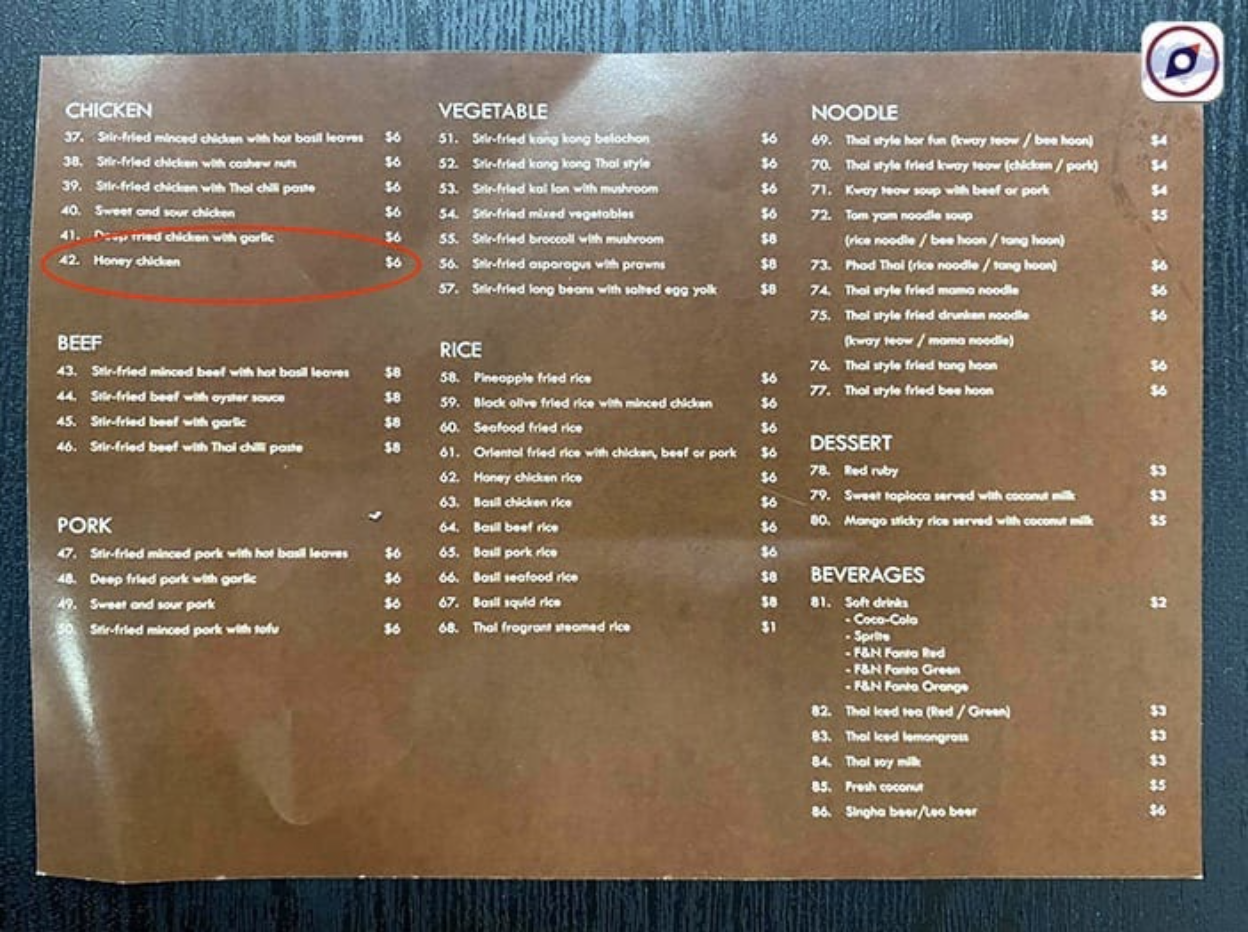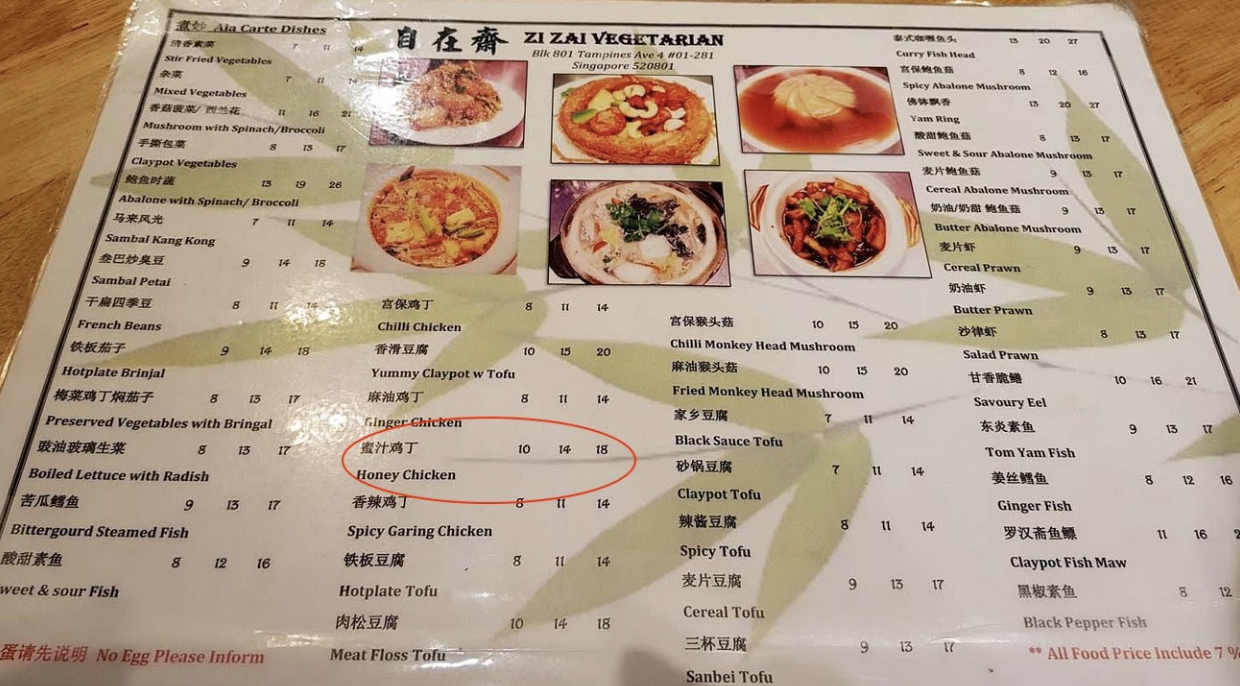Is Singapore ready to be plant-based?
With the onset of social media influencers, plant-based lifestyles are at their early stages of becoming a trend. Lavonne Yew finds out more.
A plant-based diet refers to the abstinence of meat in one’s meals. Photo courtesy of Ng Yee Teng.
BY
Lavonne Yew
Deputy Editor
Hype Issue #53
Published on
Aug 5, 2021
The power of social media influencers is not foreign to our society today. According to Statista, 51 per cent of 3,468 survey respondents aged 16 and above “purchased an item or product because it was endorsed by an influencer in Singapore, as of October 2020”.
It is thus no surprise that influencers are able to spread the beauty and benefits of plant-based lifestyles, despite meat still being very popular in our society. We spoke to three different influencers to gain insights into this topic.
Ng Yee Teng, 16, is a student who promotes the vegetarian lifestyle on her Instagram page.

Yee Teng has 13.3 thousand followers on her Instagram page promoting the vegetarian diet. Screenshot by Lavonne Yew.
“I started a food account so that I can find like-minded people and share wholesome nutritious food [with] everyone,” says Yee Teng. “I hope that through sharing recipes and yummy food photography, I can inspire people and change the stigma that vegetarian and vegan food are boring. My intention is to inspire people [to] eat more plant-based meals.”
Ms Emily Yeo, 23, is a nutrition student who runs a similar Instagram account and a food blog website depicting her delectable dishes, desserts and bakes.
She puts in visible efforts to garnish her food and bring out bright colours, making the vegan diet seem like a dream.

Ms Yeo’s Instagram page promoting the vegan diet has 40.7 thousand followers. Screenshot by Lavonne Yew.
“I started my instagram page [at] around the age of 15, when I started to eat healthy. Initially, I started my instagram page mainly to document my ‘what I eat [in] a day’. However, soon many people started noticing me and my page, and started following me,” says Ms Yeo.
Mr Goh Jun Xuan, 31, is an environmental engineer who also owns a Facebook and Instagram vegetarian food blog.

Mr Goh’s Facebook page has 714 likes and 836 followers, while his Instagram page has a following of 3,256. Screenshot by Lavonne Yew.
“These platforms allowed me to advocate a plant-based diet to a broader audience, including people who may not necessarily be on a plant-based diet but are curious about it,” says Mr Goh.
He also shared that his girlfriend started to adopt a plant-based diet after chancing upon his Instagram account and being inspired to try out his food recommendations.
HYPE conducted a survey on 113 people in Singapore to gather their sentiments. 79.6 per cent of respondents do see a rising trend of vegan/vegetarian lifestyles nowadays.
Marco Ang Tan, 20, has been a vegetarian all his life. He highlights the improvement in society’s acceptance towards vegetarians.
“Last time, people will make fun of you for being a vegetarian,” says Marco. “But now when I tell people I’m a vegetarian, they will be amazed and actually ask me how I [do] it and whether it’s hard or tough for me.”
People abstain from meat due to multiple reasons. Religion, love for animals, and care for the environment are just some of them.
Our respondents think that the most prominent reason why animal lovers still eat meat would be the convenience. There is a lack of options for vegans and vegetarians in Singapore.

In most circumstances, vegetarian/vegan options are limited. Photo courtesy of Marco Ang Tan.
Marco underlines the increase in accessibility of vegetarian food in recent years.
“When I was in primary school, there [were] no stalls catered [for] my vegetarian needs. I had to survive [on] only either white rice and baked beans or Milo and unhealthy snacks,” Marco recounts. “There are more vegetarian options [recently].”
Some of the biggest fast-food chains in Singapore, such as KFC and MOS Burger, can be seen putting in the effort to reach out to the vegans/vegetarians.
However, according to TODAYonline, KFC reported that their products are fried in the same oil as meat products. The mayonnaise that they use also contains eggs.

MOS burger also informs customers in their Impossible Burger poster that their patty ‘is cooked with other patties on the same grill’. Image taken from MOS Burger Singapore’s Facebook page.
Their efforts have thus received backlash from the public. Our survey respondents cited: “it defeats the purpose”, “it’s not a wise move” and “ineffective in promoting the [vegan/vegetarian] lifestyle”.
“Strict, religious vegetarians might not be comfortable with their plant-based dishes being prepared using the same oil or cooking utensils as other meat dishes,” says Mr Goh.
However, he appreciates the attempts of the Food and Beverage companies (F&Bs) in respecting and accommodating people with different dietary preferences. He is happy to see more plant-based options in various F&Bs in recent years.
The second biggest obstacle that our survey respondents have noted is price.

A plate of Honey Chicken costs $6 at Nakhon Kitchen. Photo taken from S.K.YEO ERA.

A plate of mock Honey Chicken costs $10–$18 at Zi Zai Vegetarian store. Photo taken from Loh K W.
“[Once], when I [ordered prata], I had to pay [extra] for the dhal curry (vegetarian curry) but meat-eaters do not need to pay extra for their curry,” Marco points out.
According to Statista, Singaporeans also mostly adopt plant-based diets for health reasons.
Research from the National Library of Medicine has noted an increase in the risk of cardiovascular problems among youths. More youths are overweight and suffer from hypertension.
However, there has been a debate as to whether the plant-based diet actually has health benefits.
With reference to Harvard Health Blog, some studies have shown that plant-based diets are associated with “lower rates of heart disease, type 2 diabetes, and some cancers”, while some have pointed out that there is a higher risk of stroke for vegans and vegetarians than for meat-eaters.
However, Harvard Health Blog has mentioned that these dietary studies are limited and are not the be-all and end-all conclusions, as there are other factors that cannot be controlled.
“The term ‘plant-based’ has become a buzzword in the media, and there are many new developments in Singapore’s food scene,” says Mr Goh.
He adds: “These are all encouraging signs showing that Singapore is ready to adopt the rising trend of a plant-based diet. While cost is still a factor discouraging people from choosing plant-based alternatives, I expect that prices will eventually drop with growing demand as market forces come into play.”
Should Singaporeans be preparing for a more plant-based future? How can we do so?

After reading your article, it reminded me of some things about gate io that I studied before. The content is similar to yours, but your thinking is very special, which gave me a different idea. Thank you. But I still have some questions I want to ask you, I will always pay attention. Thanks.
… [Trackback]
[…] Read More on to that Topic: hypesingapore.com/index.php/2021/08/05/is-singapore-ready-to-be-plant-based/ […]
… [Trackback]
[…] Info on that Topic: hypesingapore.com/index.php/2021/08/05/is-singapore-ready-to-be-plant-based/ […]
… [Trackback]
[…] Find More on on that Topic: hypesingapore.com/index.php/2021/08/05/is-singapore-ready-to-be-plant-based/ […]
… [Trackback]
[…] Here you will find 12029 more Info on that Topic: hypesingapore.com/index.php/2021/08/05/is-singapore-ready-to-be-plant-based/ […]
<a href=”https://buyalphagamin.com/product/gps-garmin-alpha-10k-command-monitoring-dog-training/”rel”dofollow”>GPS Garmin Alpha 10K Command Monitoring Dog Training</a>
<a href=”https://buyalphagamin.com/product/collar-k-5x-k5x-gps-garmin-dog-for-atemos-100-alpha-200i-k-alpha-10-k/”rel”dofollow”>Collar K 5X – K5X GPS Garmin Dog for Atemos 100 – Alpha 200i K – Alpha 10 K</a>
<a href=”https://buyalphagamin.com/product/necklace-tt-15x-tt15x-gps-garmin-dog-for-alpha-100-alpha-200i-alpha-10/”rel”dofollow”>Necklace TT 15X – TT15X GPS Garmin Dog for Alpha 100 – Alpha 200i – Alpha 10</a>
<a href=”https://buyalphagamin.com/product/collar-t-5x-training-gps-garmin-dog-for-alpha-100-or-200i/”rel”dofollow”>Collar T 5x Training GPS Garmin Dog for Alpha 100 or 200i</a>
<a href=”https://buyalphagamin.com/product/collar-kt-15x-kt15x-gps-garmin-dog-for-atemos-100-alpha-200i-k-alpha-10-k/”rel”dofollow”>Collar KT 15X – (KT15X) GPS Garmin Dog for Atemos 100 – Alpha 200i K – Alpha 10 K</a>
<a href=”https://buyalphagamin.com/product/garmin-alpha-200-gps-dog-gps-topographic-map-of-the-country-you-want/”rel”dofollow”>Garmin Alpha 200 GPS Dog GPS + Topographic Map of the country you want.</a>
<a href=”https://buyalphagamin.com/product/garmin-alpha-200-k-gps-dog-gps-topographic-map-of-the-country-you-want/”rel”dofollow”>Garmin Alpha 200 K GPS Dog GPS + Topographic Map of the country you want</a>
<a href=”https://buyalphagamin.com/product/gps-garmin-alpha-10-command-monitoring-collar-t5x-dog-2/”rel”dofollow”>GPS Garmin Alpha 10 Command Monitoring + Collar T5X Dog</a>
<a href=”https://buyalphagamin.com/product/gps-garmin-alpha-10-command-monitoring-collar-tt15x-tt-15x-training-dog-2/”rel”dofollow”>GPS Garmin Alpha 10 Command Monitoring + Collar TT15X (TT 15X) training Dog</a>
<a href=”https://buyalphagamin.com/product/gps-garmin-alpha-300-k-300k-gps-dog-detailed-topographic-map/”rel”dofollow”>GPS Garmin Alpha 300 K (300K) GPS Dog + Detailed Topographic Map</a>
<a href=”https://buyalphagamin.com/product/gps-garmin-alpha-10-command-monitoring-collar-t5x-dog/”rel”dofollow”>GPS Garmin Alpha 10 Command Monitoring + Collar T5X Dog</a>
<a href=”https://buyalphagamin.com/product/gps-garmin-alpha-10-command-monitoring-collar-tt15x-tt-15x-training-dog/”rel”dofollow”>GPS Garmin Alpha 10 Command Monitoring + Collar TT15X (TT 15X) training Dog</a>
<a href=”https://buyalphagamin.com/product/dog-collar-t-20-t20-gps-garmin-for-alpha-300-300i-alpha-100-alpha-200i-alpha-10/”rel”dofollow”>Dog Collar T 20 (T20) GPS Garmin for Alpha 300 – 300i – Alpha 100 – Alpha 200i – Alpha 10</a>
<a href=”https://buyalphagamin.com/product/collar-tt-25-tt25-training-gps-garmin-for-alpha-300-300i-alpha-100-alpha-200i-alpha-10/”rel”dofollow”>Collar TT 25 (TT25) training GPS Garmin for Alpha 300 – 300i – Alpha 100 – Alpha 200i – Alpha 10</a>
<a href=”https://buyalphagamin.com/product/gps-garmin-command-alpha-300-gps-dog-t20-necklace-detailed-topographic-map/”rel”dofollow”>GPS Garmin Command Alpha 300 GPS Dog + T20 Necklace + Detailed Topographic Map</a>
<a href=”https://buyalphagamin.com/product/gps-garmin-command-alpha-300-gps-dog-tt25-necklace-training-detailed-topographic-map/”rel”dofollow”>GPS Garmin Command Alpaha 300 GPS Dog + TT25 Necklace Training + Detailed Topographic Map</a>
<a href=”https://buyalphagamin.com/product/gps-garmin-alpha-300-k-300k-collar-t20k-dog-detailed-topographic-map/”rel”dofollow”>GPS Garmin Alpha 300 K (300K) + Collar T20K Dog + Detailed Topographic Map</a>
<a href=”https://buyalphagamin.com/product/gps-garmin-alpha-300-k-300k-collar-tt25k-dog-detailed-topographic-map/”rel”dofollow”>GPS Garmin Alpha 300 K (300K) + Collar TT25K Dog + Detailed Topographic Map</a>
<a href=”https://buyalphagamin.com/product/collar-garmin-alpha-lte-for-tracking-dogs-with-a-mobile-phone/”rel”dofollow”>Collar Garmin Alpha LTE for tracking dogs with a mobile phone</a>
<a href=”https://buyalphagamin.com/product/collar-tt-25-k-tt25k-kt25-adiestramiento-gps-garmin-para-alpha-300k-300i-k-atemos-100-alpha-200i-k-alpha-10-k/”rel”dofollow”>Collar TT 25 K (TT25K – KT25) adiestramiento GPS Garmin para Alpha 300K – 300i K – Atemos 100 – Alpha 200i K – Alpha 10 K</a>
… [Trackback]
[…] Find More on that Topic: hypesingapore.com/index.php/2021/08/05/is-singapore-ready-to-be-plant-based/ […]
… [Trackback]
[…] Find More Info here on that Topic: hypesingapore.com/index.php/2021/08/05/is-singapore-ready-to-be-plant-based/ […]
… [Trackback]
[…] There you will find 66388 more Info to that Topic: hypesingapore.com/index.php/2021/08/05/is-singapore-ready-to-be-plant-based/ […]
… [Trackback]
[…] Info to that Topic: hypesingapore.com/index.php/2021/08/05/is-singapore-ready-to-be-plant-based/ […]
… [Trackback]
[…] Read More Info here on that Topic: hypesingapore.com/index.php/2021/08/05/is-singapore-ready-to-be-plant-based/ […]
… [Trackback]
[…] Find More Info here to that Topic: hypesingapore.com/index.php/2021/08/05/is-singapore-ready-to-be-plant-based/ […]
jazz music
… [Trackback]
[…] Find More to that Topic: hypesingapore.com/index.php/2021/08/05/is-singapore-ready-to-be-plant-based/ […]
… [Trackback]
[…] Info on that Topic: hypesingapore.com/index.php/2021/08/05/is-singapore-ready-to-be-plant-based/ […]
… [Trackback]
[…] Find More on on that Topic: hypesingapore.com/index.php/2021/08/05/is-singapore-ready-to-be-plant-based/ […]
… [Trackback]
[…] Read More to that Topic: hypesingapore.com/index.php/2021/08/05/is-singapore-ready-to-be-plant-based/ […]
I don’t think the title of your article matches the content lol. Just kidding, mainly because I had some doubts after reading the article. https://www.binance.com/pt-BR/register?ref=OMM3XK51
… [Trackback]
[…] Read More to that Topic: hypesingapore.com/index.php/2021/08/05/is-singapore-ready-to-be-plant-based/ […]
I really like reading through a post that can make men and women think. Also, thank you for allowing me to comment!
<a href=https://gunsforsale.tech/product-category/380-ammo-for-sale// rel=”dofollow”>380 ammo for sale</a>
<a href=https://gunsforsale.tech/product/blackhorn-209// rel=”dofollow”>blackhorn 209</a>
<a href=https://gunsforsale.tech/product/imr-4064// rel=”dofollow”>imr 4064</a>
<a href=https://gunsforsale.tech/product/h4831sc// rel=”dofollow”>h4831sc</a>
<a href=https://gunsforsale.tech/product-category/9mm-rip-ammo// rel=”dofollow”>9mm rip ammo</a>
<a href=https://gunsforsale.tech/product/beretta-92fs-compact// rel=”dofollow”>beretta 92fs compact</a>
<a href=https://gunsforsale.tech/product-category/9mm-rip-ammo// rel=”dofollow”>9mm rip ammo</a>
<a href=https://gunsforsale.tech/product/ramshot-tac// rel=”dofollow”>ramshot tac</a>
<a href=https://gunsforsale.tech/product/kimber-pro-carry-2// rel=”dofollow”>Kimber pro carry 2</a>
<a href=https://gunsforsale.tech/product/labradar-chronograph-for-sale// rel=”dofollow”>labradar chronograph for sale</a>
<a href=https://gunsforsale.tech/product/holosun-508t// rel=”dofollow”>holosun 508t</a>
<a href=https://gunsforsale.tech/product/holosun-509t// rel=”dofollow”>holosun 509t</a>
<a href=https://gunsforsale.tech/product/geissele-trigger// rel=”dofollow”>geissele trigger</a>
<a href=https://gunsforsale.tech/product/harris-bipod// rel=”dofollow”>harris bipod</a>
<a href=https://gunsforsale.tech/product/holosun-507k// rel=”dofollow”>holosun 507k</a>
<a href=https://gunsforsale.tech/product/compstock// rel=”dofollow”>compstock</a>
<a href=https://gunsforsale.tech/product/alamo-15// rel=”dofollow”>alamo 15</a>
<a href=https://gunsforsale.tech/product/wot-trigger// rel=”dofollow”>wot trigger</a>
<a href=https://gunsforsale.tech/product/atlas-bipod// rel=”dofollow”>atlas-bipod</a>
<a href=https://gunsforsale.tech/product/vortex-viper-reddot// rel=”dofollow”>vortex viper reddot</a>
<a href=https://gunsforsale.tech/product/glock-26-slide// rel=”dofollow”>glock 26 slide</a>
<a href=https://gunsforsale.tech/product/sig-romeo-zero// rel=”dofollow”>sig romeo zero</a>
<a href=https://gunsforsale.tech/product/burris-rt6// rel=”dofollow”>burris rt6</a>
<a href=https://gunsforsale.tech/product/glock-43-slide// rel=”dofollow”>glock 43 slide</a>
<a href=https://gunsforsale.tech/product/spikes-tactical-lower// rel=”dofollow”>spikes tactical lower</a>
<a href=https://gunsforsale.tech/product/olight-baldr-pro// rel=”dofollow”>olight baldr pro</a>
<a href=https://gunsforsale.tech/product/b3-archery// rel=”dofollow”>b3 archery</a>
<a href=https://gunsforsale.tech/product/p80-frame// rel=”dofollow”>p80 frame</a>
<a href=https://gunsforsale.tech/product/hawk-treestands// rel=”dofollow”>hawk treestands</a>
<a href=https://gunsforsale.tech/product/eotech-eflx// rel=”dofollow”>eotech eflx</a>
<a href=https://gunsforsale.tech/product/eotech-vudu-1-8// rel=”dofollow”>eotech vudu 1-8</a>
<a href=https://gunsforsale.tech/product/eotech-vudu-1-10// rel=”dofollow”>eotech vudu 1-10</a>
reptile
<a href=https://alphamegaflower.com/product/pax-era-pods-near-me// rel=”dofollow”>pax era pods near me</a>
<a href=https://reptilebase.com/product/black-leopard-gecko// rel=”dofollow”>black leopard gecko</a>
<a href=https://reptilebase.com/product/red-tegu// rel=”dofollow”>red tegu</a>
<a href=https://reptilebase.com/product/black-ball-python// rel=”dofollow”>black ball python</a>
<a href=https://reptilebase.com/product/panda-pied-ball-python// rel=”dofollow”>panda pied ball python</a>
<a href=https://reptilebase.com/product/lesser-ball-python// rel=”dofollow”>lesser ball python</a>
<a href=https://reptilebase.com/product/black-eyed-tree-frog// rel=”dofollow”>black eyed tree frog</a>
<a href=https://reptilebase.com/product/hognose-snake-for-sale// rel=”dofollow”>hognose snake for sale</a>
<a href=https://reptilebase.com/product/zero-bearded-dragon// rel=”dofollow”>zero bearded dragon</a>
<a href=https://reptilebase.com/product/red-morph-bearded-dragon// rel=”dofollow”>red morph bearded dragon</a>
<a href=https://reptilebase.com/product/frilled-lizard-for-sale// rel=”dofollow”>frilled lizard for sale</a>
<a href=https://reptilebase.com/product/rubber-ducky-isopod// rel=”dofollow”>rubber ducky isopod</a>
<a href=https://reptilebase.com/product/lemon-blast-ball-python// rel=”dofollow”>lemon blast ball python</a>
<a href=https://reptilebase.com/product/pewter-ball-python// rel=”dofollow”>pewter ball python</a>
<a href=https://reptilebase.com/product/pastel-calico-ball-python// rel=”dofollow”>pastel calico ball python</a>
<a href=https://reptilebase.com/product/marginated-tortoise// rel=”dofollow”>marginated tortoise</a>
<a href=https://reptilebase.com/product/radiated-tortoise// rel=”dofollow”>radiated tortoise</a>
<a href=https://reptilebase.com/product/russian-tortoise-for-sale// rel=”dofollow”>russian tortoise for sale</a>
<a href=https://reptilebase.com/product/blue-tongue-lizard// rel=”dofollow”>blue tongue lizard</a>
<a href=https://reptilebase.com/product/albino-ball-python// rel=”dofollow”>albino ball python</a>
<a href=https://reptilebase.com/product/black-pastel-python// rel=”dofollow”>black pastel python</a>
<a href=https://reptilebase.com/product/40-gallon-terrarium// rel=”dofollow”>40 gallon terrarium</a>
<a href=https://reptilebase.com/product/super-pastel-ball-python// rel=”dofollow”>super pastel ball python</a>
<a href=https://reptilebase.com/product/yellow-anaconda// rel=”dofollow”>yellow anaconda</a>
<a href=https://reptilebase.com/product/false-water-cobra-for-sale// rel=”dofollow”>false water cobra for sale</a>
<a href=https://reptilebase.com/product/mexican-black-kingsnake-for-sale// rel=”dofollow”>mexican black kingsnake for sale</a>
<a href=https://reptilebase.com/product/40-gallon-bearded-dragon-tank// rel=”dofollow”>40 gallon bearded dragon tank</a>
<a href=https://reptilebase.com/product/blood-python-for-sale// rel=”dofollow”>blood python for sale</a>
For the reason that the admin of this site is working, no uncertainty very quickly it will be renowned, due to its quality contents.
This was beautiful Admin. Thank you for your reflections.
Great information shared.. really enjoyed reading this post thank you author for sharing this post .. appreciated
Great information shared.. really enjoyed reading this post thank you author for sharing this post .. appreciated
I truly appreciate your technique of writing a blog. I added it to my bookmark site list and will
This is really interesting, You’re a very skilled blogger. I’ve joined your feed and look forward to seeking more of your magnificent post. Also, I’ve shared your site in my social networks!
… [Trackback]
[…] There you can find 33239 additional Info on that Topic: hypesingapore.com/index.php/2021/08/05/is-singapore-ready-to-be-plant-based/ […]
… [Trackback]
[…] Read More Information here on that Topic: hypesingapore.com/index.php/2021/08/05/is-singapore-ready-to-be-plant-based/ […]
… [Trackback]
[…] Here you will find 35324 additional Information on that Topic: hypesingapore.com/index.php/2021/08/05/is-singapore-ready-to-be-plant-based/ […]
… [Trackback]
[…] Read More to that Topic: hypesingapore.com/index.php/2021/08/05/is-singapore-ready-to-be-plant-based/ […]
… [Trackback]
[…] Information on that Topic: hypesingapore.com/index.php/2021/08/05/is-singapore-ready-to-be-plant-based/ […]
ในสิ้นสุดนี้ เราหวังว่าบทความนี้จะเพิ่มความสนุกสนานให้กับทุกท่านที่กำลังมองหาแพลตฟอร์มการพนันออนไลน์ที่ดี อย่าง UFABET เป็นอย่างยิ่ง! สำหรับท่านที่สนใจและต้องการเข้าร่วมเล่นกับ UFABET อยากขอเสียงเชิญให้คลิกสมัครสมาชิกรับประสบการณ์การพนันออนไลน์ที่มันส์เหมือนโมเมนท์สุดอัศจรรย์ ที่ไม่มีวันหมดอายุครับ!
… [Trackback]
[…] There you can find 71712 more Information on that Topic: hypesingapore.com/index.php/2021/08/05/is-singapore-ready-to-be-plant-based/ […]
Pretty! This has been a really wonderful post. Many thanks for providing these details.
I am truly thankful to the owner of this web site who has shared this fantastic piece of writing at at this place.
This is really interesting, You’re a very skilled blogger. I’ve joined your feed and look forward to seeking more of your magnificent post. Also, I’ve shared your site in my social networks!
I truly appreciate your technique of writing a blog. I added it to my bookmark site list and will
Pretty! This has been a really wonderful post. Many thanks for providing these details.
very informative articles or reviews at this time.
Nice post. I learn something totally new and challenging on websites
Great information shared.. really enjoyed reading this post thank you author for sharing this post .. appreciated
There is definately a lot to find out about this subject. I like all the points you made
I truly appreciate your technique of writing a blog. I added it to my bookmark site list and will
Very well presented. Every quote was awesome and thanks for sharing the content. Keep sharing and keep motivating others.
I appreciate you sharing this blog post. Thanks Again. Cool.
This was beautiful Admin. Thank you for your reflections.
I very delighted to find this internet site on bing, just what I was searching for as well saved to fav
Very well presented. Every quote was awesome and thanks for sharing the content. Keep sharing and keep motivating others.
I truly appreciate your technique of writing a blog. I added it to my bookmark site list and will
Great information shared.. really enjoyed reading this post thank you author for sharing this post .. appreciated
very informative articles or reviews at this time.
<a href=”https://snowcapsmoonrockofficial.com/” rel=”dofollow”>drip snow caps weed</a>
<a href=”https://snowcapsmoonrockofficial.com/” rel=”dofollow”>purple snow cone strain</a>
<a href=”https://snowcapsmoonrockofficial.com/” rel=”dofollow”>snowcap moonrock</a>
<a href=”https://snowcapsmoonrockofficial.com/” rel=”dofollow”>snow cone strain</a>
<a href=”https://snowcapsmoonrockofficial.com/” rel=”dofollow”>snow weed jar</a>
<a href=”https://snowcapsmoonrockofficial.com/” rel=”dofollow”>ice capz moonrock</a>
<a href=”https://snowcapsmoonrockofficial.com/” rel=”dofollow”>ice capz moonrocks</a>
<a href=”https://snowcapsmoonrockofficial.com/” rel=”dofollow”>gemz infused snowcaps</a>
<a href=”https://snowcapsmoonrockofficial.com/” rel=”dofollow”>snow caps moonrock</a>
<a href=”https://officialkawsmoonrocks.com.com/” rel=”dofollow”>persy snowball minis</a>
<a href=”https://officialkawsmoonrocks.com.com/” rel=”dofollow”>kaws rocks gelato</a>
<a href=”https://officialkawsmoonrocks.com.com/” rel=”dofollow”>persy snowcaps</a>
<a href=”https://officialkawsmoonrocks.com.com/” rel=”dofollow”>kaws moonrocks</a>
<a href=”https://boutiqdisposables.com/” rel=”dofollow”>boutiq disposables</a>
<a href=”https://boutiqdisposables.com/” rel=”dofollow”>boutiq disposable</a>
<a href=”https://boutiqdisposables.com/” rel=”dofollow”>boutiq disposable real or fake</a>
<a href=”https://boutiqdisposables.com/” rel=”dofollow”>boutiq disposable review</a>
<a href=”https://boutiqdisposables.com/” rel=”dofollow”>boutiq disposable charging</a>
<a href=”https://boutiqdisposables.com/” rel=”dofollow”>boutiq vape</a>
<a href=”https://boutiqdisposables.com/” rel=”dofollow”>boutiq disposable vape</a>
<a href=”https://boutiqdisposables.com/” rel=”dofollow”>boutiq</a>
<a href=”https://boutiqdisposables.com/” rel=”dofollow”>boutiq dispos</a>
<a href=”https://boutiqdisposables.com/” rel=”dofollow”>boutiq disposable price</a>
<a href=”https://boutiqdisposables.com/” rel=”dofollow”>boutiq carts</a>
<a href=”https://boutiqdisposables.com/” rel=”dofollow”>boutiq carts real or fake</a>
<a href=”https://boutiqdisposables.com/” rel=”dofollow”>the boutiq</a>
<a href=”https://boutiqdisposables.com/” rel=”dofollow”>boutiq v2 disposable</a>
<a href=”https://boutiqdisposables.com/” rel=”dofollow”>boutiq live resin disposable</a>
<a href=”https://boutiqdisposables.com/” rel=”dofollow”>are boutiq disposables real</a>
<a href=”https://boutiqdisposables.com/” rel=”dofollow”>boutiq carts review</a>
<a href=”https://boutiqdisposables.com/” rel=”dofollow”>boutiq switch flavors</a>
<a href=”https://boutiqdisposables.com/” rel=”dofollow”>boutique disposable</a>
<a href=”https://boutiqdisposables.com/” rel=”dofollow”>boutiq disposable carts</a>
<a href=”https://boutiqdisposables.com/” rel=”dofollow”>boutiq switch disposable review</a>
<a href=”https://boutiqdisposables.com/” rel=”dofollow”>boutiq flavors</a>
<a href=”https://boutiqdisposables.com/” rel=”dofollow”>boutiq disposable flavors</a>
<a href=”https://boutiqdisposables.com/” rel=”dofollow”>boutiq mini joints</a>
<a href=”https://boutiqdisposables.com/” rel=”dofollow”>are boutiq carts real</a>
<a href=”https://boutiqdisposables.com/” rel=”dofollow”>boutiq carts price</a>
<a href=”https://boutiqdisposables.com/” rel=”dofollow”>boutiq vape pens</a>
<a href=”https://boutiqdisposables.com/” rel=”dofollow”>boutiq live resin</a>
<a href=”https://boutiqdisposables.com/” rel=”dofollow”>boutiques disposable</a>
<a href=”https://dripdiamondsofficial.com/” rel=”dofollow”>dripping sprinkles strain</a>
<a href=”https://dripdiamondsofficial.com/” rel=”dofollow”>drip snowcaps</a>
<a href=”https://dripdiamondsofficial.com/” rel=”dofollow”>drip diamonds</a>
<a href=”https://dripdiamondsofficial.com/” rel=”dofollow”>drip diamonds wax</a>
<a href=”https://dripdiamondsofficial.com/” rel=”dofollow”>drip diamonds disposable</a>
<a href=”https://dripdiamondsofficial.com/” rel=”dofollow”>drip diamond</a>
<a href=”https://dripdiamondsofficial.com/” rel=”dofollow”>drip diamonds exotic edition</a>
<a href=”https://dripdiamondsofficial.com/” rel=”dofollow”>drip diamonds carts</a>
<a href=”https://dripdiamondsofficial.com/” rel=”dofollow”>drip diamond wax</a>
<a href=”https://dripdiamondsofficial.com/” rel=”dofollow”>drip snowcap</a>
<a href=”https://dripdiamondsofficial.com/” rel=”dofollow”>drip dimonds</a>
<a href=”https://dripdiamondsofficial.com/” rel=”dofollow”>drip diamonds disposable 2g</a>
<a href=”https://dripdiamondsofficial.com/” rel=”dofollow”>dripping diamonds extracts</a>
<a href=”https://dripdiamondsofficial.com/” rel=”dofollow”>drip diamonds concentrate</a>
<a href=”https://dripdiamondsofficial.com/” rel=”dofollow”>drip diamonds wax real or fake</a>
<a href=”https://dripdiamondsofficial.com/” rel=”dofollow”>drip diamonds 1g disposable</a>
<a href=”https://dripdiamondsofficial.com/” rel=”dofollow”>drip diamonds 3.5</a>
<a href=”https://dripdiamondsofficial.com/” rel=”dofollow”>drip diamond disposable 2g</a>
<a href=”https://dripdiamondsofficial.com/” rel=”dofollow”>popsicle drip premium crumble</a>
<a href=”https://dripdiamondsofficial.com/” rel=”dofollow”>drip diamonds disposable reddit</a>
<a href=”https://dripdiamondsofficial.com/” rel=”dofollow”>diamond extracts</a>
<a href=”https://dripdiamondsofficial.com/” rel=”dofollow”>drip diamonds vape pen</a>
<a href=”https://dripdiamondsofficial.com/” rel=”dofollow”>diamond concentrate for sale</a>
<a href=”https://dripdiamondsofficial.com/” rel=”dofollow”>diamond concentrates wholesale</a>
<a href=”https://officialpiffcarts.com/” rel=”dofollow”>piff carts</a>
<a href=”https://officialpiffcarts.com/” rel=”dofollow”>piff candy edition real or fake</a>
<a href=”https://officialpiffcarts.com/” rel=”dofollow”>piff bar candy edition</a>
<a href=”https://officialpiffcarts.com/” rel=”dofollow”>piff carts candy edition</a>
<a href=”https://officialpiffcarts.com/” rel=”dofollow”>piff smarties cart</a>
<a href=”https://officialpiffcarts.com/” rel=”dofollow”>piff carts 2g</a>
<a href=”https://officialpiffcarts.com/” rel=”dofollow”>pif carts</a>
<a href=”https://officialpiffcarts.com/” rel=”dofollow”>piff bar cart</a>
<a href=”https://officialpiffcarts.com/” rel=”dofollow”>piff bar cart reviews</a>
<a href=”https://officialpiffcarts.com/” rel=”dofollow”>piff bar carts</a>
<a href=”https://officialpiffcarts.com/” rel=”dofollow”>piff disposable carts</a>
<a href=”https://officialpiffcarts.com/” rel=”dofollow”>piff bar official</a>
<a href=”https://officialpiffcarts.com/” rel=”dofollow”>piff bar dessert edition</a>
<a href=”https://officialpiffcarts.com/” rel=”dofollow”>piff cart</a>
<a href=”https://officialpiffcarts.com/” rel=”dofollow”>piff bar cart real or fake</a>
<a href=”https://officialpiffcarts.com/” rel=”dofollow”>piff live resin</a>
<a href=”https://officialpiffcarts.com/” rel=”dofollow”>piff blue nerds</a>
<a href=”https://officialpiffcarts.com/” rel=”dofollow”>piff disposable vape</a>
<a href=”https://officialpiffcarts.com/” rel=”dofollow”>puff bar carts</a>
<a href=”https://officialpiffcarts.com/” rel=”dofollow”>piff disposable candy edition</a>
<a href=”https://officialpiffcarts.com/” rel=”dofollow”>piff disposable cart</a>
<a href=”https://officialpiffcarts.com/” rel=”dofollow”>piff candy extracts</a>
<a href=”https://officialpiffcarts.com/” rel=”dofollow”>piff star fruit</a>
<a href=”https://officialpiffcarts.com/” rel=”dofollow”>piff online</a>
<a href=”https://officialpiffcarts.com/” rel=”dofollow”>piff disposable vape candy edition</a>
<a href=”https://officialpiffcarts.com/” rel=”dofollow”>piff skittlez</a>
<a href=”https://officialpiffcarts.com/” rel=”dofollow”>piff vapes</a>
<a href=”https://officialpiffcarts.com/” rel=”dofollow”>piff cotton candy gelato</a>
<a href=”https://officialpiffcarts.com/” rel=”dofollow”>piff bars thc</a>
<a href=”https://gronediblesofficial.com/” rel=”dofollow”>gron edibles</a>
<a href=”https://gronediblesofficial.com/” rel=”dofollow”>groncbd</a>
<a href=”https://gronediblesofficial.com/” rel=”dofollow”>gron</a>
<a href=”https://gronediblesofficial.com/” rel=”dofollow”>gron watermelon pearls</a>
<a href=”https://gronediblesofficial.com/” rel=”dofollow”>grön edibles</a>
<a href=”https://gronediblesofficial.com/” rel=”dofollow”>grön chocolate</a>
<a href=”https://officialmagictruffleschocolate.com/” rel=”dofollow”>magic truffles syrup</a>
v<a href=”https://officialmagictruffleschocolate.com/” rel=”dofollow”>magic truffles copyright syrup</a>
<a href=”https://officialmagictruffleschocolate.com/” rel=”dofollow”>magic truffles black mamba</a>
<a href=”https://officialmagictruffleschocolate.com/” rel=”dofollow”>magic truffles thai boomer</a>
<a href=”https://officialmagictruffleschocolate.com/” rel=”dofollow”>magic truffles chocolate mini bar</a>
<a href=”https://officialmagictruffleschocolate.com/” rel=”dofollow”>magictruffleshrooms</a>
<a href=”https://officialmagictruffleschocolate.com/” rel=”dofollow”>magic truffles chocolates</a>
<a href=”https://officialmagictruffleschocolate.com/” rel=”dofollow”>cambodian chocolate</a>
<a href=”https://officialmagictruffleschocolate.com/” rel=”dofollow”>thai boomer chocolate</a>
<a href=”https://officialmagictruffleschocolate.com/” rel=”dofollow”>magic truffle brand</a>
<a href=”https://officialmagictruffleschocolate.com/” rel=”dofollow”>- buy amazonian copyright chocolate bar for sale</a>
<a href=”https://officialmagictruffleschocolate.com/” rel=”dofollow”>mexicana truffles</a>
<a href=”https://officialmagictruffleschocolate.com/” rel=”dofollow”>buy mexicana truffles</a>
<a href=”https://officialmagictruffleschocolate.com/” rel=”dofollow”>buy magic truffles online</a>
<a href=”https://officialmagictruffleschocolate.com/” rel=”dofollow”>magic truffles online</a>
<a href=”https://officialmagictruffleschocolate.com/” rel=”dofollow”>buy magic truffles mexicana</a>
<a href=”https://officialmagictruffleschocolate.com/” rel=”dofollow”>psycociblin</a>
<a href=”https://officialmagictruffleschocolate.com/” rel=”dofollow”>magic truffles brand</a>
<a href=”https://officialmagictruffleschocolate.com/” rel=”dofollow”>magic truffles for sale</a>
<a href=”https://officialmagictruffleschocolate.com/” rel=”dofollow”>mexicana magic truffles</a>
<a href=”https://officialmagictruffleschocolate.com/” rel=”dofollow”>thai boomer</a>
<a href=”https://officialmagictruffleschocolate.com/” rel=”dofollow”>buy magic truffles</a>
<a href=”https://officialmagictruffleschocolate.com/” rel=”dofollow”>magic truffles chocolate bar</a>
<a href=”https://officialmagictruffleschocolate.com/” rel=”dofollow”>magic truffles chocolate</a>
<a href=”https://officialmagictruffleschocolate.com/” rel=”dofollow”>thai truffle</a>
<a href=”https://officialmagictruffleschocolate.com/” rel=”dofollow”>penis envy chocolates</a>
<a href=”https://officialmagictruffleschocolate.com/” rel=”dofollow”>magic white chocolate</a>
<a href=”https://officialmagictruffleschocolate.com/” rel=”dofollow”>chocolate boomer</a>
<a href=”https://officialmagictruffleschocolate.com/” rel=”dofollow”>magic truffles amazonian</a>
<a href=”https://officialmagictruffleschocolate.com/” rel=”dofollow”>magictrufflesbrand</a>
<a href=”https://officialmagictruffleschocolate.com/” rel=”dofollow”>boomer chocolate</a>
<a href=”https://officialmagictruffleschocolate.com/” rel=”dofollow”>magic truffle chocolate bar</a>
<a href=”https://officialmagictruffleschocolate.com/” rel=”dofollow”>blueberry mambaz strain</a>
<a href=”https://officialmagictruffleschocolate.com/” rel=”dofollow”>amazonia truffel</a>
<a href=”https://officialmagictruffleschocolate.com/” rel=”dofollow”>copyright truffles for sale</a>
<a href=”https://officialmagictruffleschocolate.com/” rel=”dofollow”>truffle chocolate mushroom</a>
<a href=”https://officialmagictruffleschocolate.com/” rel=”dofollow”>albino chocolate</a>
<a href=”https://officialmagictruffleschocolate.com/” rel=”dofollow”>thai truffles</a>
<a href=”https://officialmagictruffleschocolate.com/” rel=”dofollow”>albino penis envy chocolate bar</a>
<a href=”https://officialmagictruffleschocolate.com/” rel=”dofollow”>magic truffles buy online</a>
<a href=”https://officialmagictruffleschocolate.com/” rel=”dofollow”>albino penis envy for sale</a>
<a href=”https://officialmagictruffleschocolate.com/” rel=”dofollow”>chocolate mexicana</a>
<a href=”https://officialmagictruffleschocolate.com/” rel=”dofollow”>coco albino</a>
<a href=”https://officialmagictruffleschocolate.com/” rel=”dofollow”>magic sugar effects</a>
<a href=”https://officialmagictruffleschocolate.com/” rel=”dofollow”>mamba chocolate</a>
<a href=”https://officialmagictruffleschocolate.com/” rel=”dofollow”>mexicana chocolate</a>
<a href=”https://officialmagictruffleschocolate.com/” rel=”dofollow”>syrup magic</a>
<a href=”https://officialmagictruffleschocolate.com/” rel=”dofollow”>foto di golden truffle</a>
<a href=”https://officialmagictruffleschocolate.com/” rel=”dofollow”>albinos bar</a>
<a href=”https://officialmagictruffleschocolate.com/” rel=”dofollow”>magic truffles sale</a>
<a href=”https://officialmagictruffleschocolate.com/” rel=”dofollow”>golden teacher truffles</a>
<a href=”https://officialmagictruffleschocolate.com/” rel=”dofollow”>are chocolate truffles mushrooms</a>
<a href=”https://officialmagictruffleschocolate.com/” rel=”dofollow”>albino a+ magic mushrooms</a>
<a href=”https://officialmagictruffleschocolate.com/” rel=”dofollow”>penis envy chocolate bar</a>
<a href=”https://officialmagictruffleschocolate.com/” rel=”dofollow”>golden teacher truffle</a>
<a href=”https://officialmagictruffleschocolate.com/” rel=”dofollow”>truffle mushroom chocolate</a>
<a href=”https://lostfarmediblesofficial.com/” rel=”dofollow”>lost farm edibles</a>
<a href=”https://lostfarmediblesofficial.com/” rel=”dofollow”>lost farm edibles review</a>
<a href=”https://lostfarmediblesofficial.com/” rel=”dofollow”>lost farm cherry lime review</a>
<a href=”https://lostfarmediblesofficial.com/” rel=”dofollow”>lost farms edibles review</a>
<a href=”https://lostfarmediblesofficial.com/” rel=”dofollow”>lost farms</a>
<a href=”https://lostfarmediblesofficial.com/” rel=”dofollow”>tangerine sunset</a>
<a href=”https://lostfarmediblesofficial.com/” rel=”dofollow”>onlione shopping</a>
<a href=”https://lostfarmediblesofficial.com/” rel=”dofollow”>lost farm pomberry</a>
<a href=”https://lostfarmediblesofficial.com/” rel=”dofollow”>lost farm</a>
<a href=”https://lostfarmediblesofficial.com/” rel=”dofollow”>lost farm edibles near me</a>
<a href=”https://officialselectcarts.com/” rel=”dofollow”>select carts</a>
<a href=”https://officialselectcarts.com/” rel=”dofollow”>select carts price</a>
<a href=”https://officialselectcarts.com/” rel=”dofollow”>select elite carts online</a>
<a href=”https://officialselectcarts.com/” rel=”dofollow”>elite select carts</a>
<a href=”https://officialselectcarts.com/” rel=”dofollow”>select elite carts</a>
<a href=”https://officialselectcarts.com/” rel=”dofollow”>ray charles strain select</a>
<a href=”https://officialselectcarts.com/” rel=”dofollow”>are select carts good</a>
<a href=”https://officialselectcarts.com/” rel=”dofollow”>select elite live carts</a>
<a href=”https://officialselectcarts.com/” rel=”dofollow”>select carts review</a>
<a href=”https://officialselectcarts.com/” rel=”dofollow”>select elite cart</a>
<a href=”https://officialselectcarts.com/” rel=”dofollow”>select elite carts review</a>
<a href=”https://officialselectcarts.com/” rel=”dofollow”>select elite cartridges review</a>
<a href=”https://officialselectcarts.com/” rel=”dofollow”>select carts near me</a>
<a href=”https://officialselectcarts.com/” rel=”dofollow”>select strawberry cough</a>
<a href=”https://officialselectcarts.com/” rel=”dofollow”>select elite cartridges</a>
<a href=”https://officialselectcarts.com/” rel=”dofollow”>cart select</a>
<a href=”https://officialselectcarts.com/” rel=”dofollow”>select blue dream</a>
<a href=”https://officialselectcarts.com/” rel=”dofollow”>select cart battery</a>
<a href=”https://officialselectcarts.com/” rel=”dofollow”>ghost train haze near me</a>
<a href=”https://officialselectcarts.com/” rel=”dofollow”>select elite</a>
<a href=”https://officialpuffindisposable.com/” rel=”dofollow”>puffin disposable</a>
<a href=”https://officialpuffindisposable.com/” rel=”dofollow”>puffin 2g</a>
<a href=”https://officialpuffindisposable.com/” rel=”dofollow”>puffin cherry slushy</a>
<a href=”https://officialpuffindisposable.com/” rel=”dofollow”>citrus slushy puffin</a>
<a href=”https://officialpuffindisposable.com/” rel=”dofollow”>puffin watermelon</a>
<a href=”https://officialpuffindisposable.com/” rel=”dofollow”>puffin cart disposable</a>
<a href=”https://officialpuffindisposable.com/” rel=”dofollow”>puffin wax</a>
<a href=”https://officialpuffindisposable.com/” rel=”dofollow”>puffin nicotine</a>
<a href=”https://officialpuffindisposable.com/” rel=”dofollow”>puffin 2g disposable</a>
<a href=”https://officialpuffindisposable.com/” rel=”dofollow”>puffin premium live resin</a>
<a href=”https://officialpuffindisposable.com/” rel=”dofollow”>puffin disposable carts</a>
<a href=”https://officialpuffindisposable.com/” rel=”dofollow”>2g puffins</a>
<a href=”https://officialpuffindisposable.com/” rel=”dofollow”>ace ultra premium 2g disposable</a>
<a href=”https://officialpuffindisposable.com/” rel=”dofollow”>puffin disposable flavors</a>
<a href=”https://officialpuffindisposable.com/” rel=”dofollow”>puffin sour diesel</a>
<a href=”https://officialpuffindisposable.com/” rel=”dofollow”>puffin 2 gram disposable</a>
<a href=”https://officialpuffindisposable.com/” rel=”dofollow”>puffin disposable vape</a>
<a href=”https://officialpuffindisposable.com/” rel=”dofollow”>puffin wax precio</a>
<a href=”https://officialpuffindisposable.com/” rel=”dofollow”>puffin disposable thc</a>
<a href=”https://officialpuffindisposable.com/” rel=”dofollow”>puffin live resin</a>
<a href=”https://officialpuffindisposable.com/” rel=”dofollow”>wax puffin</a>
<a href=”https://officialpuffindisposable.com/” rel=”dofollow”>puffin vapes</a>
<a href=”http://turncarts.com/shop/” rel=”dofollow”>Turn Disposable</a>
<a href=”https://wundergummies.co/” rel=”dofollow”>wunder gummies</a>
<a href=”https://wundergummies.co/” rel=”dofollow”>entheogenic nootropic blend mushroom gummies effects</a>
<a href=”https://wundergummies.co/” rel=”dofollow”>wunder mushroom gummies</a>
<a href=”https://wundergummies.co/” rel=”dofollow”>wunder entheogenic nootropic blend mushroom gummies</a>
<a href=”https://wundergummies.co/” rel=”dofollow”>dotz amanita muscaria</a>
<a href=”https://wundergummies.co/” rel=”dofollow”>wunder amanita</a>
<a href=”https://wundergummies.co/” rel=”dofollow”>dotzgummies</a>
<a href=”https://wundergummies.co/” rel=”dofollow”>dotz gummies</a>
<a href=”https://wundergummies.co/” rel=”dofollow”>wunder entheogenic nootropic blend review</a>
<a href=”https://wundergummies.co/” rel=”dofollow”>wunder amanita muscaria gummies</a>
<a href=”https://wundergummies.co/” rel=”dofollow”>wunder amanita muscaria gummies review</a>
<a href=”https://wundergummies.co/” rel=”dofollow”>entheogenic nootropic blend mushroom gummies</a>
<a href=”https://wundergummies.co/” rel=”dofollow”>dotz mushroom gummies</a>
<a href=”https://wundergummies.co/” rel=”dofollow”>wunder entheogenic nootropic blend</a>
<a href=”https://wundergummies.co/” rel=”dofollow”>wunder grow bags</a>
<a href=”https://wundergummies.co/” rel=”dofollow”>wunder gummies review</a>
<a href=”https://wundergummies.co/” rel=”dofollow”>kava extract gummy</a>
<a href=”https://wundergummies.co/” rel=”dofollow”>kava gummies for sale</a>
<a href=”https://wundergummies.co/” rel=”dofollow”>dotz amanita gummies</a>
<a href=”https://wundergummies.co/” rel=”dofollow”>wunder mushroom gummies 7500mg</a>
<a href=”https://wundergummies.co/” rel=”dofollow”>wunder mushrooms</a>
<a href=”https://wundergummies.co/” rel=”dofollow”>entheogenic nootropic</a>
<a href=”https://wundergummies.co/” rel=”dofollow”>kava extract gummies</a>
<a href=”https://wundergummies.co/” rel=”dofollow”>wunder grow bags review</a>
<a href=”https://wundergummies.co/” rel=”dofollow”>wunder entheogenic mushroom gummies</a>
<a href=”https://wundergummies.co/” rel=”dofollow”>dotz gummies review</a>
<a href=”https://wundergummies.co/” rel=”dofollow”>delta 9 mushroom gummies</a>
<a href=”https://wundergummies.co/” rel=”dofollow”>wunder entheogenic nootropic blend reviews</a>
<a href=”https://wundergummies.co/” rel=”dofollow”>wunder amanita muscaria</a>
<a href=”https://wundergummies.co/” rel=”dofollow”>2500 mg amanita muscaria</a>
<a href=”https://wundergummies.co/” rel=”dofollow”>kava kava 5000mg</a>
<a href=”https://wundergummies.co/” rel=”dofollow”>entheogenic mushroom gummies</a>
<a href=”https://wundergummies.co/” rel=”dofollow”>wunder mushroom gummies 7500mg review</a>
<a href=”https://wundergummies.co/” rel=”dofollow”>kava mushroom gummies</a>
<a href=”https://wundergummies.co/” rel=”dofollow”>kava extract gummies</a>
<a href=”https://wundergummies.co/” rel=”dofollow”>wunder mushroom gummies review</a>
<a href=”https://wundergummies.co/” rel=”dofollow”>5000 mg amanita muscaria</a>
<a href=”https://wundergummies.co/” rel=”dofollow”>proprietary entheogenic nootropic blend</a>
<a href=”https://wundergummies.co/” rel=”dofollow”>dotz mushroom gummies review</a>
<a href=”https://wundergummies.co/” rel=”dofollow”>dotz mushrooms</a>
<a href=”https://wundergummies.co/” rel=”dofollow”>entheogenic nootropic blend</a>
<a href=”https://wundergummies.co/” rel=”dofollow”>what is entheogenic nootropic blend</a>
<a href=”https://wundergummies.co/” rel=”dofollow”>wunder entheogenic mushroom gummies review</a>
<a href=”https://wundergummies.co/” rel=”dofollow”>dotz mushroom</a>
<a href=”https://wundergummies.co/” rel=”dofollow”>amanita muscaria mushroom gummies (5000mg)</a>
<a href=”https://wundergummies.co/” rel=”dofollow”>buy mushroom gummies online</a>
<a href=”https://wundergummies.co/” rel=”dofollow”>wunder mushroom</a>
<a href=”https://wundergummies.co/” rel=”dofollow”>amanita muscaria gummies for sale</a>
<a href=”https://wundergummies.co/” rel=”dofollow”>amanita muscaria gummies for sale online</a>
<a href=”https://wundergummies.co/” rel=”dofollow”>sustrate</a>
<a href=”https://wundergummies.co/” rel=”dofollow”>buy amanita mushroom gummies online</a>
<a href=”https://wundergummies.co/” rel=”dofollow”>buy amanita muscaria</a>
<a href=”https://deathbygummybears.co/” rel=”dofollow”>death by gummy bears</a>
<a href=”https://deathbygummybears.co/” rel=”dofollow”>death by gummies</a>
<a href=”https://deathbygummybears.co/” rel=”dofollow”>death by gummy bear</a>
<a href=”https://deathbygummybears.co/” rel=”dofollow”>death by gummy bears 2500mg</a>
<a href=”https://deathbygummybears.co/” rel=”dofollow”>gummy bears of death</a>
<a href=”https://deathbygummybears.co/” rel=”dofollow”>death by gummy bears 1000mg review</a>
<a href=”https://deathbygummybears.co/” rel=”dofollow”>death by gummy</a>
<a href=”https://deathbygummybears.co/” rel=”dofollow”>death by gummy bears 1000mg</a>
<a href=”https://deathbygummybears.co/” rel=”dofollow”>death by gummy bears review</a>
<a href=”https://deathbygummybears.co/” rel=”dofollow”>death bear gummies</a>
<a href=”https://deathbygummybears.co/” rel=”dofollow”>gummy bear death</a>
<a href=”https://deathbygummybears.co/” rel=”dofollow”>hhc gummy bear</a>
<a href=”https://deathbygummybears.co/” rel=”dofollow”>death by gummy bears delta 8</a>
<a href=”https://deathbygummybears.co/” rel=”dofollow”>dbg gummies</a>
<a href=”https://deathbygummybears.co/” rel=”dofollow”>death by gummie</a>
<a href=”https://deathbygummybears.co/” rel=”dofollow”>death gummies</a>
<a href=”https://deathbygummybears.co/” rel=”dofollow”>gummy bear syrup</a>
<a href=”https://deathbygummybears.co/” rel=”dofollow”>death of a gummy bear</a>
<a href=”https://deathbygummybears.co/” rel=”dofollow”>death by gummy bears death</a>
<a href=”https://deathbygummybears.co/” rel=”dofollow”>gummies by dbg</a>
<a href=”https://officialdimedisposable.com/” rel=”dofollow”>dime carts near me</a>
<a href=”https://officialdimedisposable.com/” rel=”dofollow”>dime cart flavors</a>
<a href=”https://officialdimedisposable.com/” rel=”dofollow”>dime carts flavors</a>
<a href=”https://officialdimedisposable.com/” rel=”dofollow”>dime bag carts</a>
<a href=”https://officialdimedisposable.com/” rel=”dofollow”>dime industries bubblegum kush</a>
<a href=”https://officialdimedisposable.com/” rel=”dofollow”>fake dime carts</a>
<a href=”https://officialdimedisposable.com/” rel=”dofollow”>dime disposable near me</a>
<a href=”https://officialdimedisposable.com/” rel=”dofollow”>dime industries wedding cake</a>
<a href=”https://officialdimedisposable.com/” rel=”dofollow”>do dime carts work with any battery</a>
<a href=”https://officialdimedisposable.com/” rel=”dofollow”>dime wedding cake disposable</a>
<a href=”https://officialdimedisposable.com/” rel=”dofollow”>dime industries fake</a>
<a href=”https://officialdimedisposable.com/” rel=”dofollow”>dime disposable flavors</a>
<a href=”https://officialdimedisposable.com/” rel=”dofollow”>dime wedding cake</a>
<a href=”https://officialdimedisposable.com/” rel=”dofollow”>dime all in one device</a>
<a href=”https://officialdimedisposable.com/” rel=”dofollow”>dime battery near me</a>
<a href=”https://officialdimedisposable.com/” rel=”dofollow”>dime industries near me</a>
<a href=”https://officialdimedisposable.com/” rel=”dofollow”>dime carts review</a>
<a href=”https://officialdimedisposable.com/” rel=”dofollow”>dime industries all in one</a>
<a href=”https://officialdimedisposable.com/” rel=”dofollow”>peach kush</a>
<a href=”https://officialdimedisposable.com/” rel=”dofollow”>dime banana mac</a>
<a href=”https://officialdimedisposable.com/” rel=”dofollow”>strawberry cough dime disposable</a>
<a href=”https://officialdimedisposable.com/” rel=”dofollow”>dime apple gelato</a>
<a href=”https://officialdimedisposable.com/” rel=”dofollow”>dime carts real or fake</a>
<a href=”https://officialdimedisposable.com/” rel=”dofollow”>dime bag cart</a>
<a href=”https://officialdimedisposable.com/” rel=”dofollow”>are dime carts real</a>
<a href=”https://officialdimedisposable.com/” rel=”dofollow”>dime industries banana punch</a>
<a href=”https://officialdimedisposable.com/” rel=”dofollow”>dime industries strawberry cough</a>
<a href=”https://officialdimedisposable.com/” rel=”dofollow”>dime industries sour grape</a>
<a href=”https://officialdimedisposable.com/” rel=”dofollow”>dime strawberry cough review</a>
<a href=”https://officialdimedisposable.com/” rel=”dofollow”>shmac 1 strain</a>
<a href=”https://officialdimedisposable.com/” rel=”dofollow”>dime carts</a>
<a href=”https://officialdimedisposable.com/” rel=”dofollow”>sour grape dime disposable</a>
<a href=”https://officialdimedisposable.com/” rel=”dofollow”>dime near me</a>
<a href=”https://officialdimedisposable.com/” rel=”dofollow”>push cart dim sum san francisco</a>
<a href=”https://officialdimedisposable.com/” rel=”dofollow”>dime bubblegum kush</a>
<a href=”https://officialdimedisposable.com/” rel=”dofollow”>are dime carts good</a>
<a href=”https://officialdimedisposable.com/” rel=”dofollow”>apple gelato dime</a>
<a href=”https://officialdimedisposable.com/” rel=”dofollow”>cart dim sum near me</a>
<a href=”https://officialdimedisposable.com/” rel=”dofollow”>dime sour grape</a>
<a href=”https://officialdimedisposable.com/” rel=”dofollow”>dime bag near me</a>
<a href=”https://officialdimedisposable.com/” rel=”dofollow”>sour grape dime</a>
<a href=”https://officialdimedisposable.com/” rel=”dofollow”>dime industries all in one review</a>
<a href=”https://officialdimedisposable.com/” rel=”dofollow”>banana punch dime</a>
<a href=”https://officialdimedisposable.com/” rel=”dofollow”>bubblegum kush</a>
<a href=”https://officialdimedisposable.com/” rel=”dofollow”>dime mango diesel</a>
<a href=”https://officialdimedisposable.com/” rel=”dofollow”>dime industries blueberry lemon haze</a>
<a href=”https://officialdimedisposable.com/” rel=”dofollow”>wedding cake dime</a>
<a href=”https://officialdimedisposable.com/” rel=”dofollow”>blueberry lemon haze dime</a>
<a href=”https://officialdimedisposable.com/” rel=”dofollow”>dimenine</a>
<a href=”https://officialdimedisposable.com/” rel=”dofollow”>dime berry white</a>
<a href=”https://officialdimedisposable.com/” rel=”dofollow”>dime og strain</a>
<a href=”https://officialdimedisposable.com/” rel=”dofollow”>dime forbidden apple</a>
<a href=”https://officialdimedisposable.com/” rel=”dofollow”>dime industries apple gelato</a>
<a href=”https://officialdimedisposable.com/” rel=”dofollow”>dime industries disposable near me</a>
<a href=”https://officialdimedisposable.com/” rel=”dofollow”>fake dime</a>
<a href=”https://officialdimedisposable.com/” rel=”dofollow”>strawberry dime</a>
<a href=”https://officialdimedisposable.com/” rel=”dofollow”>mango diesel dime review</a>
<a href=”https://officialdimedisposable.com/” rel=”dofollow”>bubblegum kush dime</a>
<a href=”https://officialdimedisposable.com/” rel=”dofollow”>banana mac dime</a>
<a href=”https://officialdimedisposable.com/” rel=”dofollow”>dimes disposable</a>
<a href=”https://officialdimedisposable.com/” rel=”dofollow”>cantaloupe runtz strain</a>
<a href=”https://officialdimedisposable.com/” rel=”dofollow”>dime cantaloupe dream</a>
<a href=”https://officialdimedisposable.com/” rel=”dofollow”>dime cart review</a>
<a href=”https://officialdimedisposable.com/” rel=”dofollow”>cantaloupe dream</a>
<a href=”https://officialdimedisposable.com/” rel=”dofollow”>dime og disposable</a>
<a href=”https://officialdimedisposable.com/” rel=”dofollow”>cantaloupe dream strain</a>
<a href=”https://officialdimedisposable.com/” rel=”dofollow”>mango diesel dime</a>
<a href=”https://officialdimedisposable.com/” rel=”dofollow”>dime industries cart</a>
<a href=”https://officialdimedisposable.com/” rel=”dofollow”>dimo disposable</a>
<a href=”https://officialdimedisposable.com/” rel=”dofollow”>dime cart battery</a>
<a href=”https://officialdimedisposable.com/” rel=”dofollow”>dime battery heat settings</a>
<a href=”https://officialdimedisposable.com/” rel=”dofollow”>dime blueberry lemon haze disposable</a>
<a href=”https://officialdimedisposable.com/” rel=”dofollow”>dim sum cart</a>
<a href=”https://officialdimedisposable.com/” rel=”dofollow”>dime industries mango diesel</a>
<a href=”https://officialdimedisposable.com/” rel=”dofollow”>dime og</a>
<a href=”https://officialdimedisposable.com/” rel=”dofollow”>dime disposable carts</a>
<a href=”https://officialdimedisposable.com/” rel=”dofollow”>cake dimes</a>
<a href=”https://flavedibleofficial.com/” rel=”dofollow”>flav edibles</a>
<a href=”https://flavedibleofficial.com/” rel=”dofollow”>flav peach rings</a>
<a href=”https://flavedibleofficial.com/” rel=”dofollow”>flav belts 1000mg</a>
<a href=”https://flavedibleofficial.com/” rel=”dofollow”>peach ring edibles prices</a>
<a href=”https://flavedibleofficial.com/” rel=”dofollow”>flav peach rings 1000mg</a>
<a href=”https://flavedibleofficial.com/” rel=”dofollow”>flav belts 1000mg review</a>
<a href=”https://flavedibleofficial.com/” rel=”dofollow”>flav edibles review</a>
<a href=”https://flavedibleofficial.com/” rel=”dofollow”>flav cannabis infused gummies</a>
<a href=”https://flavedibleofficial.com/” rel=”dofollow”>flav rings 1000mg review</a>
<a href=”https://flavedibleofficial.com/” rel=”dofollow”>flav belts 1000mg price</a>
<a href=”https://flavedibleofficial.com/” rel=”dofollow”>flav 1000mg</a>
<a href=”https://flavedibleofficial.com/” rel=”dofollow”>100mg edible peach rings</a>
<a href=”https://flavedibleofficial.com/” rel=”dofollow”>edible peach rings</a>
<a href=”https://flavedibleofficial.com/” rel=”dofollow”>flav edible</a>
<a href=”https://flavedibleofficial.com/” rel=”dofollow”>flav belts review</a>
<a href=”https://flavedibleofficial.com/” rel=”dofollow”>flav rings 1000mg</a>
<a href=”https://flavedibleofficial.com/” rel=”dofollow”>flav gummies 1000mg</a>
<a href=”https://flavedibleofficial.com/” rel=”dofollow”>flav 1000mg belts</a>
<a href=”https://flavedibleofficial.com/” rel=”dofollow”>flav belts edibles</a>
<a href=”https://flavedibleofficial.com/” rel=”dofollow”>how to make peach ring edibles</a>
<a href=”https://allediblesshop.com/” rel=”dofollow”>chronic elixir kache</a>
<a href=”https://allediblesshop.com/” rel=”dofollow”>stoney the higher standard</a>
<a href=”https://allediblesshop.com/” rel=”dofollow”>stars of death edibles</a>
<a href=”https://allediblesshop.com/” rel=”dofollow”>shroomiez</a>
<a href=”https://allediblesshop.com/” rel=”dofollow”>crybaby carts</a>
<a href=”https://allediblesshop.com/” rel=”dofollow”>sweet n loud edibles review</a>
<a href=”https://allediblesshop.com/” rel=”dofollow”>neau tropics mint spray</a>
<a href=”https://allediblesshop.com/” rel=”dofollow”>shroomiez chocolate bar</a>
<a href=”https://allediblesshop.com/” rel=”dofollow”>ace ultra premium where to buy</a>
<a href=”https://allediblesshop.com/” rel=”dofollow”>smart melts</a>
<a href=”https://allediblesshop.com/” rel=”dofollow”>goldfather disposables</a>
<a href=”https://allediblesshop.com/” rel=”dofollow”>ace ultra premium</a>
<a href=”https://allediblesshop.com/” rel=”dofollow”>sweed n loud</a>
<a href=”https://allediblesshop.com/” rel=”dofollow”>devour thc syrup</a>
<a href=”https://allediblesshop.com/” rel=”dofollow”>ace ultra premium 2g disposable</a>
<a href=”https://allediblesshop.com/” rel=”dofollow”>sweet and loud edible</a>
<a href=”https://allediblesshop.com/” rel=”dofollow”>shrumfuzed</a>
<a href=”https://allediblesshop.com/” rel=”dofollow”>greenbox disposable carts</a>
<a href=”https://allediblesshop.com/” rel=”dofollow”>punch bar edibles</a>
<a href=”https://allediblesshop.com/” rel=”dofollow”>california gold carts</a>
<a href=”https://allediblesshop.com/” rel=”dofollow”>rocket gummies edibles</a>
<a href=”https://allediblesshop.com/” rel=”dofollow”>desert stardust mushroom effects</a>
<a href=”https://allediblesshop.com/” rel=”dofollow”>crybaby cartridge</a>
<a href=”https://allediblesshop.com/” rel=”dofollow”>crybaby thc carts</a>
<a href=”https://allediblesshop.com/” rel=”dofollow”>sweed n loud edibles</a>
<a href=”https://allediblesshop.com/” rel=”dofollow”>puffin 2000mg disposable</a>
<a href=”https://allediblesshop.com/” rel=”dofollow”>halo carts official</a>
<a href=”https://allediblesshop.com/” rel=”dofollow”>favorites xl disposable</a>
<a href=”https://allediblesshop.com/” rel=”dofollow”>goldfather vape</a>
<a href=”https://allediblesshop.com/” rel=”dofollow”>stoney’s gummies</a>
<a href=”https://allediblesshop.com/” rel=”dofollow”>gold father carts</a>
<a href=”https://allediblesshop.com/” rel=”dofollow”>moon edibles</a>
<a href=”https://allediblesshop.com/” rel=”dofollow”>puffin disposable cart</a>
<a href=”https://allediblesshop.com/” rel=”dofollow”>cry baby disposable</a>
<a href=”https://allediblesshop.com/” rel=”dofollow”>pink pussy weed</a>
<a href=”https://allediblesshop.com/” rel=”dofollow”>troli edibles</a>
<a href=”https://allediblesshop.com/” rel=”dofollow”>favorites cart brand</a>
<a href=”https://allediblesshop.com/” rel=”dofollow”>trolli edible</a>
<a href=”https://allediblesshop.com/” rel=”dofollow”>neautropics</a>
<a href=”https://allediblesshop.com/” rel=”dofollow”>trolli edibles 600mg</a>
<a href=”https://fkemgummiesshop.com/” rel=”dofollow”>fkem gummies</a>
<a href=”https://fkemgummiesshop.com/” rel=”dofollow”>Blueberry Blizzard 2000MG</a>
<a href=”https://fkemgummiesshop.com/” rel=”fkem gummies 2000mg</a>
<a href=”https://fkemgummiesshop.com/” rel=”dofollow”>FKEM Blueberry Blizzard Gummies 1500mg</a>
<a href=”https://fkemgummiesshop.com/” rel=”dofollow”>FKEM Blueberry Blizzard Gummies 750mg</a>
<a href=”https://fkemgummiesshop.com/” rel=”dofollow”>Fkem Fruity Punch 1500MG</a>
<a href=”https://fkemgummiesshop.com/” rel=”dofollow”>FKEM Fruity Punch Gummies 2000mg</a>
<a href=”https://fkemgummiesshop.com/” rel=”dofollow”>FKEM Fruity Punch Gummies 750mg</a>
<a href=”https://fkemgummiesshop.com/” rel=”dofollow”>Fkem Gummies 2000mg – Pack of 3</a>
<a href=”https://fkemgummiesshop.com/” rel=”dofollow”>Fkem Gummies 750mg – Pack of 8</a>
<a href=”https://fkemgummiesshop.com/” rel=”dofollow”>Fkem Gummies Wholesale 1500MG – Pack of 6</a>
<a href=”https://fkemgummiesshop.com/” rel=”dofollow”>Fkem Gummies Wholesale 2000MG</a>
<a href=”https://fkemgummiesshop.com/” rel=”dofollow”>Fkem Lava Flow Mango 2000MG</a>
<a href=”https://fkemgummiesshop.com/” rel=”dofollow”>FKEM Lava Flow Mango Gummies 750mg</a>
<a href=”https://fkemgummiesshop.com/” rel=”dofollow”>FKEM Lava Flow Mango Gummy Candy 1500mg</a>
<a href=”https://fkemgummiesshop.com/” rel=”dofollow”>FKEM Maui Orange Gummies 750MG</a>
<a href=”https://fkemgummiesshop.com/” rel=”dofollow”>FKEM OMG Gummies 750mg</a>TURN DISPOSABLE
TURN DISPOSABLE
Turn Carts are thc vape disposable now avialable in stock and ready to be shipped to all states in the usa and internationally
Looking for where to buy Turn Carts online ? Turn Carts should be your stop and shop for all Turn Carts and Turn Disposables.
Turn live resin + Liquid disposables are disposable vape cartridges filled with high-quality cannabis oil. These Turn Carts are designed for people who want to enjoy the benefit.
BUY TURN CARTS ONLINE
If you’re looking to buy Turn carts online, you can so conveniently and safely at the Official Turn Disposables. Turn Carts Disposables is a trusted and legitimate source for Turn carts. Here’s a simple guide.
–Visit Turn carts Official Website: Head over to the Official Turn carts website by entering “www.Turncarts.com”
Note that Turn Carts as a brand has a variety of products which can be categorized into the below categories;
1. Turn Down Carts Disposable
2. Turn Up Carts Disposable
3. Turn Pods
4. Turn Podpak Battery
TURN UP CARTS DISPOSABLE FLAVORS
Turn Carts have a blend of most flavors. the first edition of flavors are listed below.
1. Turn Carts Disposable – Apple Fritter
2. Turn Carts Disposable – Chem Dawg
3. Turn Carts Disposable – Gelato al Lemone
4. Turn Carts Disposable – Gone Bananas
5. Turn Carts Disposable – Lemonade Stand
6. Turn Carts Disposable – Sour Apple Soda
7. Turn Carts Disposable – Strawberry Haze
8. Turn Carts Disposable – Tokyo Sweet Rose
9. Turn Carts Disposable – Tropical Gelato
10. Turn Carts Disposable – Unicorn Party
11. Turn Carts Disposable – Vanilla Lavender Latte
Listed above are the amazing turn up carts disposable flavors. The Turn Up Carts Disposable is not your average vaping device. What sets it apart from the competition is its ability to indicate its specialized function when you change modes while using it. This innovative feature ensures that you have complete control over your vaping experience, allowing you to adjust the intensity and flavor to suit your preferences. With its sleek and compact design, it is easy to carry around and discreetly enjoy wherever you go.
TURN DOWN CARTS DISPOSABLE FLAVORS
1. Turn Carts Disposable – Berry Dreamy
2. Turn Carts Disposable – Cherry Vanilla Cola
3. Turn Carts Disposable – Dragon Fruit Açaí
4. Turn Carts Disposable – G.O.A.T. 41
5. Turn Carts Disposable – Gelato Paradiso
6. Turn Carts Disposable – Granddaddy Purp
7. Turn Carts Disposable – Kiwi Spiked Punch
8. Turn Carts Disposable – Mango x Guava
9. Turn Carts Disposable – Peaches n Cream
10. Turn Carts Disposable – Rainbow Zkittles
11. Turn Carts Disposable – Scotti
12. Turn Carts Disposable – Sugar Cookies
13. Turn Carts Disposable – Sweet Noni
14. Turn Carts Disposable – The Donut Shop
15. Turn Carts Disposable – Watermelon Sugar High
16. Turn Carts Disposable – White Gummy Bear
Turn Podpak Battery
The podpak charging case is the heart of the Turn Subpack Battery. There are three different types
1. Turn Podpak Battery – black battery case
2. Turn Podpak Battery – tokyo pink battery
3. Turn Podpak Battery – white battery case
Turn Pods
Turn Pods have become a popular choice among cannabis enthusiasts who are looking for a convenient and high–quality way to enjoy the benefits of cannabis oil. These disposable vape pens offer a unique and flavorful experience, thanks to the use of 100% live resin extraction.
1. Turn Pods – Apple Fritter 1G Pod
2. Turn Pods – Berry Dreamy 1G Pod
3. Turn Pods – Chem Dawg 1G Pod
4. Turn Pods – Cherry Vanilla Kush 1G Pod
5. Turn Pods – Dragon Fruit Açaí 1G Pod
6. Turn Pods – G.O.A.T 41 1G Pod
7. Turn Pods – Gelato Paradiso 1G Pod
8. Turn Pods – Gone Bananas 1G Pod
9. Turn Pods – Granddaddy Purp 1G Pod
10. Turn Pods – Kiwi Spiked Punch 1G Pod
11. Turn Pods – Lemonade Stand 1G Pod
12. Turn Pods – Mango x Guava OG 1G Pod
13. Turn Pods – Peaches n Cream 1G Pod
14. Turn Pods – Rainbow Zkittles 1G Pod
15. Turn Pods – Scotti 1G Pod
16. Turn Pods – Sour Apple Seltzer 1G Pod
17. Turn Pods – Strawberry Haze 1G Pod
18. Turn Pods – Sugar Cookies1G Pod
19. Turn Pods – Sweet Noni 1G Pod
20. Turn Pods – The Donut Shop 1G Pod
21. Turn Pods – Tropical Gelato 1G Pod
22. Turn Pods – Unicorn Party 1G Pod
23. Turn Pods – Watermelon Sugar High 1G Pod
24. Turn Pods – White Gummy Bear 1G Pod
TURN CARTS DISPOSABLE CARTS REAL OR FAKE
Anyone looking for the difference between Turn disposable carts real or fake should gladly hit this button (learn more)
Looking to purchase turn carts? You’ve come to the right place! Turn disposable is your one-stop shop for premium turn carts. We have a broad selection of excellent disposable vape carts that will please even the most sophisticated cannabis fans.
Turn carts takes pleasure in acquiring the best extract available on the market. Our Turn carts is made with cutting-edge extraction procedures that preserve the plant’s original tastes and healthy ingredients.
<a href=”https://turncarts.com/shop/” rel=”dofollow”>Turn Disposable</a>
<a href=”https://turncarts.com/” rel=”dofollow”>Turn Carts</a>
<a href=”https://turncarts.com/product/turn-pods-berry-dreamy-1g-pod/” rel=”dofollow”>Turn Pods</a>
<a href=”https://turncarts.com/product/turn-pods-berry-dreamy-1g-pod/” rel=”dofollow”>Turn Pod</a>
<a href=”https://turncarts.com/shop/” rel=”dofollow”>Turn Dispo</a>
<a href=”https://turncarts.com/product/turn-carts-disposable-gone-bananas/” rel=”dofollow”>Dispo Carts</a>
<a href=”https://turncarts.com/” rel=”dofollow”>disposable live resin case</a>
PACKMAN DISPOSABLE
Looking for where to buy Pac Man Carts online ? Packman Disposables should be your stop and shop for all Pac Man Carts and Packman Disposables.
packman live resin disposables are disposable vape cartridges filled with high-quality cannabis oil. These Pac Man Carts are designed for people who want to enjoy the benefit.
BUY PAC MAN CARTS ONLINE
If you’re looking to buy Pac man carts online, you can so conveniently and safely at the Official Packman Disposables. Packman Disposables is a trust and legitimate source for pac man carts. Here’s a simple guide:
–Visit Pac man carts Website: Head over to the Official pac man carts website by entering “www.packmandisposables.co” into your web browser.
PACKMAN DISPOSABLE FLAVORS
Pac Man Carts have a blend of most flavors. The first edition of flavors are listed below.
1. Grapple Berry Fritter
2. Guava Lava
3. Packman Disposable | Berry Payton (Hybrid)
4. Packman Disposable | Blue Airheads
5. Packman Disposable | Blue Razzberry Airheads
6. Packman Disposable | Blueberry Diesel (Sativa)
7. Packman Disposable | Cereal Skunk (Indica)
8. Packman Disposable | Granddaddy Urkle (Indica)
9. Packman Disposable | Lemon Head
10. Packman Disposable | Mystery Og Online
11. Packman Disposable | Peachy Nerdz Carts
12. Packman Disposable | Sunset Gelato (Hybrid)
PAC MAN DISPOSABLE CARTS REAL OR FAKE
Anyone looking for the difference between pac man disposable carts real or fake should gladly hit this button (learn more)
Looking to purchase pac man carts? You’ve come to the right place! Packman disposable is your one-stop shop for premium pac man carts. We have a broad selection of excellent disposable vape carts that will please even the most sophisticated cannabis fans.
pac man carts takes pleasure in acquiring the best extract available on the market. Our pac man carts is made with cutting-edge extraction procedures that preserve the plant’s original tastes and healthy ingredients.
PACKMAN DISPOSABLE 4 NEW FLAVORS
1. Grapple Berry Fritter
2. Guava Lava
3. Pineapple Rings
4. Unicorn Zkittles
<a href=”https://packmandisposables.co” rel=”dofollow”>pac man carts</a>
<a href=”https://packmandisposables.co” rel=”dofollow”>packman carts</a>
<a href=”https://packmandisposables.co” rel=”dofollow”>packman disposable</a>
<a href=”https://packmandisposables.co” rel=”dofollow”>pack man carts</a>
<a href=”https://packmandisposables.co/product/packman-disposable-granddaddy-urkle-indica/” rel=”dofollow”>grandaddy urkle</a>
<a href=”https://packmandisposables.co” rel=”dofollow”>pac man disposable</a>
<a href=”https://packmandisposables.co” rel=”dofollow”>packman live resin</a>
<a href=”https://packmandisposables.co” rel=”dofollow”>packman vape uk</a>
<a href=“https://packmandisposables.co” rel=”dofollow”>packman disposable canada</a>
<a href=”https://packmandisposables.co” rel=”dofollow”>packman vape germany</a>
FADED FRUITS GUMMIES
Faded Fruits gummies are thc gummies which are 500mg and having 10 pieces in each gummy pack.
<a href=”https://fadedfruitsgummies.com/product/stars-of-death-edibles-grape-blue-raspberry/” rel=”dofollow”>stars of death edibles</a>
<a href=”https://fadedfruitsgummies.com/product/cartnite-carts/” rel=”dofollow”>cartnite</a>
<a href=”https://fadedfruitsgummies.com/product/stars-of-death-edibles-grape-blue-raspberry/” rel=”dofollow”>star of death</a>
<a href=”https://fadedfruitsgummies.com/” rel=”dofollow”>faded fruits gummies</a>
<a href=”https://fadedfruitsgummies.com/product-category/faded-vapes/” rel=”dofollow”>Faded Vapes</a>
<a href=”https://fadedfruitsgummies.com/” rel=”dofollow”>Faded Fruits</a>
MOON CHOCOLATE BAR
Moon chocolate bar are 250mg bar made with love. stop and shop now.
<a href=”https://moonchocolatebar.com/” rel=”dofollow”>moon chocolate bar</a>
ROCKET GUMMIES
<a href=”https://rocketgummiesshop.com/” rel=”dofollow”>rocket gummies</a>
DANK GUMMIES
<a href=”https://dankgummiesstore.com/” rel=”dofollow”>dank gummies</a>
GOOD TRIP CHOCOLATE
<a href=”https://goodtripchocolate.com/” rel=”dofollow”>good trip chocolate</a>
<a href=”https://goodtripchocolate.com/” rel=”dofollow”>goodtrip mushroom</a>
<a href=”https://goodtripchocolate.com/” rel=”dofollow”>good trip chocolate bar</a>
<a href=”https://goodtripchocolate.com/” rel=”dofollow”>goodtrip bars</a>
PSILO GUMMIES
<a href=”https://officialpsilogummies.com/” rel=”dofollow”>psilo gummies</a>
<a href=”https://officialpsilogummies.com/” rel=”dofollow”>psilo gummy</a>
<a href=”https://officialpsilogummies.com/” rel=”dofollow”>psilo delic gummies</a>
<a href=”https://officialpsilogummies.com/” rel=”dofollow”>psilo delic</a>
<a href=”https://officialpsilogummies.com/” rel=”dofollow”>psilo.delic</a>
GOO’D EXTRACTS
<a href=”https://officialgoodextracts.com/product/good-extracts-disposable-peach-rings/” rel=”dofollow”>liquid diamonds 2 gram disposable peach rings</a>
<a href=”https://officialgoodextracts.com/” rel=”dofollow”>good extracts</a>
<a href=”https://officialgoodextracts.com/” rel=”dofollow”>goo’d extracts</a>
<a href=”https://officialgoodextracts.com/” rel=”dofollow”>goo’d extracts disposable</a>
<a href=”https://officialgoodextracts.com/product/good-extracts-disposable-rainbow-cake/” rel=”dofollow”>cake dispo</a>
FLAV EDIBLES
<a href=”https://flavgummies.com/” rel=”dofollow”>flav gummies</a>
<a href=”https://flavgummies.com/” rel=”dofollow”>Flav Edibles</a>
<a href=”https://flavgummies.com/” rel=”dofollow”>flav disposable pen</a>
<a href=”https://flavgummies.com/” rel=”dofollow”>flav edibles review</a>
SUGAR HIGH GUMMIES
<a href=”https://officialsugarhighgummies.com/” rel=”dofollow”>sugar high gummies</a>
<a href=”https://officialsugarhighgummies.com/shop/” rel=”dofollow”>sugar high gummies</a>
<a href=”https://officialsugarhighgummies.com/” rel=”dofollow”>sugarhigh gummies</a>
<a href=”https://officialsugarhighgummies.com/” rel=”dofollow”>sugar high thc gummies</a>
<a href=”https://officialsugarhighgummies.com/” rel=”dofollow”>sugar high edibles</a>
LUIGI CARTS DISPOSABLE
<a href=”https://luigidisposableofficial.com/” rel=”dofollow”>Luigi Carts Disposable</a>
<a href=”https://luigidisposableofficial.com/shop/” rel=”dofollow”>Luigi Carts Disposable</a>
<a href=”https://luigidisposableofficial.com/” rel=”dofollow”>luigi og strain</a>
<a href=”https://luigidisposableofficial.com/” rel=”dofollow”>Luigi carts</a>
<a href=”https://luigidisposableofficial.com/” rel=”dofollow”>luigi disposable</a>
<a href=”https://luigidisposableofficial.com/” rel=”dofollow”>luigi 2g disposable</a>
<a href=”https://luigidisposableofficial.com/” rel=”dofollow”>luigi cart weed packaging</a>
BESOS DISPOSABLE
<a href=”https://besosdisposablesofficial.com/” rel=”dofollow”>Besos Disposable</a>
<a href=”https://besosdisposablesofficial.com/shop/” rel=”dofollow”>Besos Disposable</a>
<a href=”https://besosdisposablesofficial.com/” rel=”dofollow”>Besos carts</a>
KREAM DISPOSABLE
<a href=”https://kreamdisposable.com/” rel=”dofollow”>kream disposable</a>
<a href=”https://kreamdisposable.com/shop/” rel=”dofollow”>kream disposable</a>
<a href=”https://kreamdisposable.com/” rel=”dofollow”>kreams dispo</a>
<a href=”https://kreamdisposable.com/shop/” rel=”dofollow”>kream 2g disposable</a>
CLEAN CARTS
<a href=”https://cleancartofficial.com/” rel=”dofollow”>cleancarts</a>
<a href=”https://cleancartofficial.com/shop/” rel=”dofollow”>cleancarts</a>
<a href=”https://cleancartofficial.com/” rel=”dofollow”>clean carts</a>
<a href=”https://cleancartofficial.com/” rel=”dofollow”>clean carts 2g disposable</a>
<a href=”https://cleancartofficial.com/” rel=”dofollow”>clean carts disposable</a>
<a href=”https://cleancartofficial.com/” rel=”dofollow”>clean carts diamonds</a>
KAWS MOONROCKS
<a href=”https://kawsrocksofficials.com/” rel=”dofollow”>kaws moonrock</a>
<a href=”https://kawsrocksofficials.com/” rel=”dofollow”>kaws rocks</a>
<a href=”https://kawsrocksofficials.com/shop/” rel=”dofollow”>kaws rocks</a>
<a href=”https://kawsrocksofficials.com/” rel=”dofollow”>kaws moon rocks</a>
<a href=”https://kawsrocksofficials.com/” rel=”dofollow”>kaws rocks moon rocks</a>
<a href=”https://kawsrocksofficials.com/” rel=”dofollow”>kaws moonrocks</a>
<a href=”https://kawsrocksofficials.com/shop/” rel=”dofollow”>kaws moonrocks</a>
<a href=”https://kawsrocksofficials.com/” rel=”dofollow”>kaws rocks france</a>
<a href=”https://kawsrocksofficials.com/” rel=”dofollow”>kaws rocks germany</a>
<a href=”https://kawsrocksofficials.com/” rel=”dofollow”>kaws moonrocks france</a>
<a href=”https://kawsrocksofficials.com/” rel=”dofollow”>kaws moon rocks for sale</a>
<a href=”https://kawsrocksofficials.com/” rel=”dofollow”>kaws moonrocks cereal edition</a>
HITZ DISPOSABLE
<a href=”https://hitzdisposableofficial.com” rel=”dofollow”>hitz disposable</a>
<a href=”https://hitzdisposableofficial.com/shop/” rel=”dofollow”></a>
<a href=”https://hitzdisposableofficial.com” rel=”dofollow”>hitz carts</a>
<a href=”https://hitzdisposableofficial.com” rel=”dofollow”>hitz 2g disposable</a>
<a href=”https://hitzdisposableofficial.com” rel=”dofollow”>high in the zone</a>
<a href=”https://hitzdisposableofficial.com” rel=”dofollow”>hitz high in the zone</a>
BLINKERS VAPES
<a href=”https://blinkersvapeofficial.com/” rel=”dofollow”>blinker vape</a>
<a href=”https://blinkersvapeofficial.com/shop/” rel=”dofollow”>blinker vape</a>
<a href=”https://blinkersvapeofficial.com/” rel=”dofollow”>blinkers carts</a>
<a href=”https://blinkersvapeofficial.com/product/blinkers-2g-vape-disposable-black-mamba/” rel=”dofollow”>black mamba blinker</a>
<a href=”https://blinkersvapeofficial.com/” rel=”dofollow”>blinker 2g cart</a>
<a href=”https://blinkersvapeofficial.com/” rel=”dofollow”>blinkers dispo</a>
<a href=”https://blinkersvapeofficial.com/” rel=”dofollow”>hitting blinkers</a>
<a href=”https://blinkersvapeofficial.com/” rel=”dofollow”>blinker disposable</a>
PUFF LA CARTS
<a href=”https://pufflacarts.com/” rel=”dofollow”>puff la carts</a>
<a href=”https://pufflacarts.com/shop/” rel=”dofollow”>puff la carts</a>
<a href=”https://pufflacarts.com/” rel=”dofollow”>puff la</a>
<a href=”https://pufflacarts.com/shop/” rel=”dofollow”>puff la</a>
<a href=”https://pufflacarts.com/” rel=”dofollow”>puff la gummies</a>
<a href=”https://pufflacarts.com/product-category/puff-la-gummies/” rel=”dofollow”>puff la gummies</a>
<a href=”https://pufflacarts.com/” rel=”dofollow”>puff la disposable</a>
<a href=”https://pufflacarts.com/” rel=”dofollow”>puff la 2g disposable</a>
FKEM GUMMIES
<a href=”https://fkemgummiesshop.com/” rel=”dofollow”>fkem gummies</a>
<a href=”https://fkemgummiesshop.com/shop/” rel=”dofollow”>fkem gummies</a>
<a href=”https://fkemgummiesshop.com/” rel=”dofollow”>fkem</a>
<a href=”https://fkemgummiesshop.com/shop/” rel=”dofollow”>fkem</a>
NEAUTROPICS
<a href=”https://neautropicschocolate.co/” rel=”dofollow”>neau tropics chocolate bar</a>
<a href=”https://neautropicschocolate.co/” rel=”dofollow”>neau tropics</a>
<a href=”https://neautropicschocolate.co/shop/” rel=”dofollow”>neau tropics</a>
<a href=”https://neautropicschocolate.co/” rel=”dofollow”>neau tropics magic mushroom gummies</a>
<a href=”https://neautropicschocolate.co/” rel=”dofollow”>neau tropics chocolate</a>
<a href=”https://neautropicschocolate.co/shop/” rel=”dofollow”>neau tropics chocolate</a>
BREEZE VAPE STORE
<a href=”https://breezevapestore.com/product-tag/breeze-vape-near-me/” rel=”dofollow”>breeze pro near me</a>
<a href=”https://breezevapestore.com/product-tag/breeze-vape-near-me/” rel=”dofollow”>breeze near me</a>
<a href=”https://breezevapestore.com/product-tag/breeze-vape-flavors/” rel=”dofollow”>breeze flavors</a>
<a href=”https://breezevapestore.com/product/breeze-vape-pro-anejo-citrus/” rel=”dofollow”>breeze pro</a>
<a href=”https://breezevapestore.com/product/breeze-vape-pro-anejo-citrus/” rel=”dofollow”>breeze pro flavors</a>
<a href=”https://breezevapestore.com/product-tag/breeze-vape-flavors/” rel=”dofollow”>breeze flavours</a>
<a href=”https://breezevapestore.com/” rel=”dofollow”>breeze vapes</a>
<a href=”https://breezevapestore.com/” rel=”dofollow”>breeze vape</a>
<a href=”https://breezevapestore.com/shop/” rel=”dofollow”>breeze vape</a>
PLATINUM VAPE
<a href=”https://platinumvapecarts.com/product-tag/platinum-carts-michigan/” rel=”dofollow”>platinum carts</a>
<a href=”https://platinumvapecarts.com/pac-man-carts/” rel=”dofollow”>Pac Man Carts</a>
<a href=”https://platinumvapecarts.com/pac-man-carts/” rel=”dofollow”>pack man carts</a>
<a href=”https://platinumvapecarts.com/” rel=”dofollow”>platinum vape</a>
<a href=”https://platinumvapecarts.com/turn-carts/” rel=”dofollow”>turn carts</a>
<a href=”https://platinumvapecarts.com/product-tag/house-of-platinum/” rel=”dofollow”>house of platinum</a>
WHOLE MELT EXTRACTS
<a href=”https://officialwholemeltextracts.co/” rel=”dofollow”>whole melt extracts</a>
<a href=”https://officialwholemeltextracts.co/shop/” rel=”dofollow”>whole melt extracts</a>
<a href=”https://officialwholemeltextracts.co/” rel=”dofollow”>whole melt dispos</a>
<a href=”https://offic